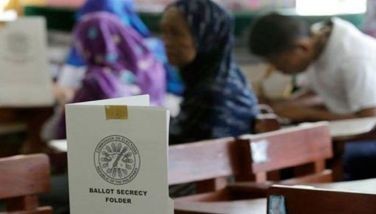Ombudsman panel admits it might not meet SC deadline on MegaPacific probe
August 4, 2006 | 12:00am
The Office of the Ombudsman might not meet the Aug. 14 deadline set by the Supreme Court (SC) for the anti-graft agency to end its investigation of the voided P1.3-billion contract between the Commission on Elections (Comelec) and a private firm for the automation of elections.
Special Prosecutor Dennis Villa-Ignacio, a member of the panel conducting the clarificatory probe, told reporters yesterday they would have to decide whether to ask the Supreme Court to extend the deadline.
"We are now doing hearings twice a week, but at this rate, we may not be able to beat the deadline," he said. "We do not want any matter untouched."
The Office of the Ombudsman started its clarificatory probe last July 13 and has been holding hearings every Tuesday and Thursday.
In yesterday’ hearing, the panel grilled Nelson Celis, Comelec consultant on the poll automation program on the change of the accuracy rating of the automated counting machines from 99.9995 percent to 99.995 percent.
The SC voided the contract which the Comelec signed with the MegaPacific consortium after it said the automated counting machines have failed to meet the 99.9995 percent accuracy rating.
However, Republic Act 8436, enacted on Dec. 22, 1997, authorized the Comelec to pursue an automated poll program, but did not indicate an accuracy rating for the automated counting machines.
Under Villa-Ignacio’s questioning, Celis said the accuracy rating of 99.995 percent was decided on by those present during a seminar workshop in Tagaytay on Aug. 1, 2003.
According to the panel, the accuracy rating for the ACMs was set at 99.995 percent during the time of Comelec Chairman Alfredo Benipayo, but was lowered to 99.995 percent during the second phase of the poll automation project.
Celis told the panel that in attendance during the workshop were Comelec Commissioner Resurreccion Borra, representatives from the National Movement for Free Elections (Namfrel), and various information technology groups, including the Information Technology Group of the Philippines, one of the complainants in the poll automation case.
"In our Tagaytay workshop, we have discerned that 99.995 percent is accurate," he said. "As an IT expert, 99.995 percent (of accuracy for the ACMs) is an acceptable accuracy rating."
Asked by Villa-Ignacio if he knew who had sponsored the Tagaytay workshop, Celis said he could not remember.
In an interview with reporters later, Villa-Ignacio said establishing who had authorized the change in the accuracy rating for the ACMs and the date when the change was ordered are considered vital areas of the investigation.
"It would seem that the dates are significant in the accuracy rating," he said.
"When did the change from 99.9995 percent to 99.995 percent happen or was it the other way around? This is significant to the panel as one of the grounds declared by the Supreme Court in voiding the contract was the failure of the machines to meet the 99.9995 rating.
"And now we have a witness who is saying that it was decided to adopt the 99.995 percent (rating)," Villa-Ignacio said.
Meanwhile, Villa-Ignacio has appealed to complainants Kilos Bayan headed by former senator Jovito Salonga, and Sen. Aquilino Pimentel Jr. to actively participate in the clarificatory hearing.
"We need the inputs of the complainants," he said.
"We still have to hear from former senator Salonga and Senator Pimentel. We would appreciate it if they could also ask clarificatory questions. I wish they would appear more interested."
On the other hand, Estrella Elamparo, MegaPacific’s lawyer, said testimonies and documents would show that there was no irregularity in the acquisition of the counting machines.
"We believe that our clients are innocent of any charges being labeled against them," she said. "The transactions were done according to the existing laws on biddings, as stipulated in the guidelines of the Comelec."— Mike Frialde
Special Prosecutor Dennis Villa-Ignacio, a member of the panel conducting the clarificatory probe, told reporters yesterday they would have to decide whether to ask the Supreme Court to extend the deadline.
"We are now doing hearings twice a week, but at this rate, we may not be able to beat the deadline," he said. "We do not want any matter untouched."
The Office of the Ombudsman started its clarificatory probe last July 13 and has been holding hearings every Tuesday and Thursday.
In yesterday’ hearing, the panel grilled Nelson Celis, Comelec consultant on the poll automation program on the change of the accuracy rating of the automated counting machines from 99.9995 percent to 99.995 percent.
The SC voided the contract which the Comelec signed with the MegaPacific consortium after it said the automated counting machines have failed to meet the 99.9995 percent accuracy rating.
However, Republic Act 8436, enacted on Dec. 22, 1997, authorized the Comelec to pursue an automated poll program, but did not indicate an accuracy rating for the automated counting machines.
Under Villa-Ignacio’s questioning, Celis said the accuracy rating of 99.995 percent was decided on by those present during a seminar workshop in Tagaytay on Aug. 1, 2003.
According to the panel, the accuracy rating for the ACMs was set at 99.995 percent during the time of Comelec Chairman Alfredo Benipayo, but was lowered to 99.995 percent during the second phase of the poll automation project.
Celis told the panel that in attendance during the workshop were Comelec Commissioner Resurreccion Borra, representatives from the National Movement for Free Elections (Namfrel), and various information technology groups, including the Information Technology Group of the Philippines, one of the complainants in the poll automation case.
"In our Tagaytay workshop, we have discerned that 99.995 percent is accurate," he said. "As an IT expert, 99.995 percent (of accuracy for the ACMs) is an acceptable accuracy rating."
Asked by Villa-Ignacio if he knew who had sponsored the Tagaytay workshop, Celis said he could not remember.
In an interview with reporters later, Villa-Ignacio said establishing who had authorized the change in the accuracy rating for the ACMs and the date when the change was ordered are considered vital areas of the investigation.
"It would seem that the dates are significant in the accuracy rating," he said.
"When did the change from 99.9995 percent to 99.995 percent happen or was it the other way around? This is significant to the panel as one of the grounds declared by the Supreme Court in voiding the contract was the failure of the machines to meet the 99.9995 rating.
"And now we have a witness who is saying that it was decided to adopt the 99.995 percent (rating)," Villa-Ignacio said.
Meanwhile, Villa-Ignacio has appealed to complainants Kilos Bayan headed by former senator Jovito Salonga, and Sen. Aquilino Pimentel Jr. to actively participate in the clarificatory hearing.
"We need the inputs of the complainants," he said.
"We still have to hear from former senator Salonga and Senator Pimentel. We would appreciate it if they could also ask clarificatory questions. I wish they would appear more interested."
On the other hand, Estrella Elamparo, MegaPacific’s lawyer, said testimonies and documents would show that there was no irregularity in the acquisition of the counting machines.
"We believe that our clients are innocent of any charges being labeled against them," she said. "The transactions were done according to the existing laws on biddings, as stipulated in the guidelines of the Comelec."— Mike Frialde
BrandSpace Articles
<
>
- Latest
- Trending
Trending
Latest
Trending
Latest
Recommended































